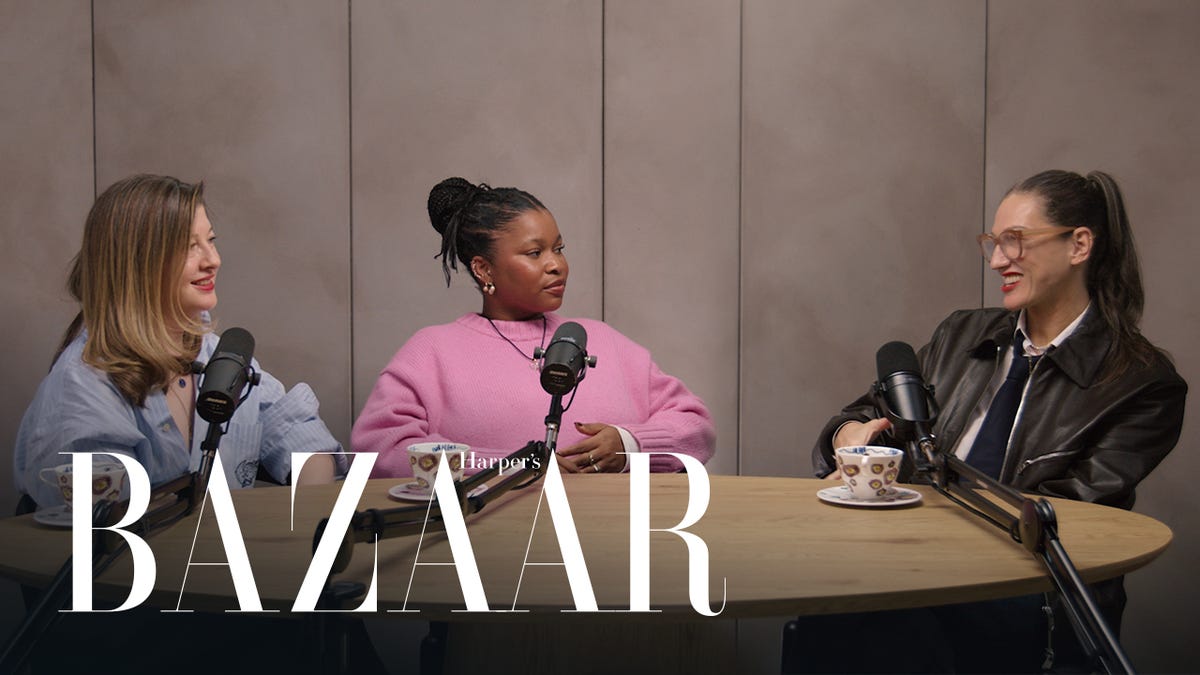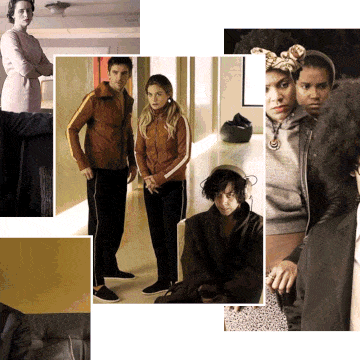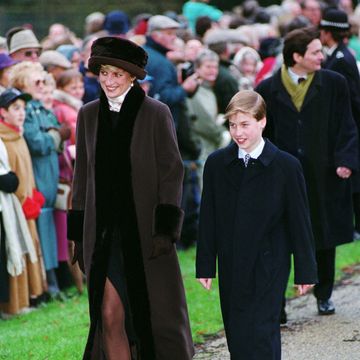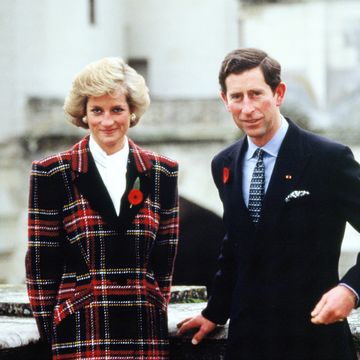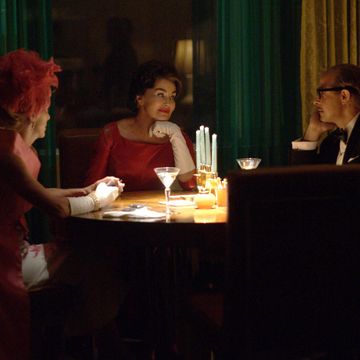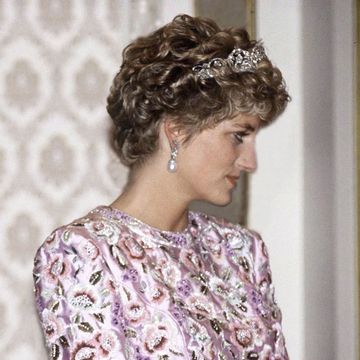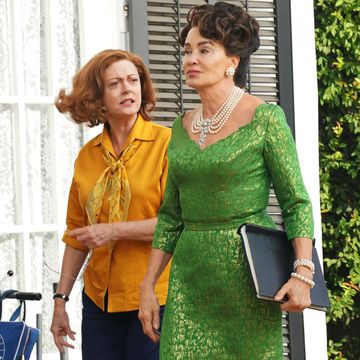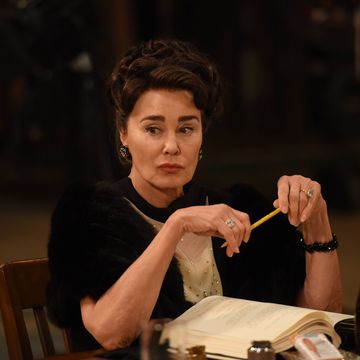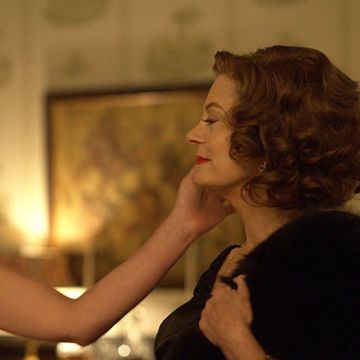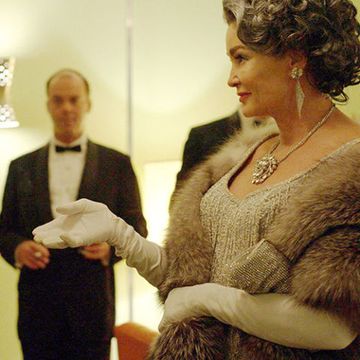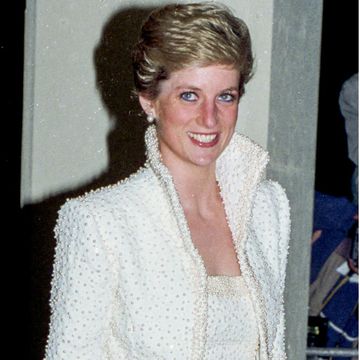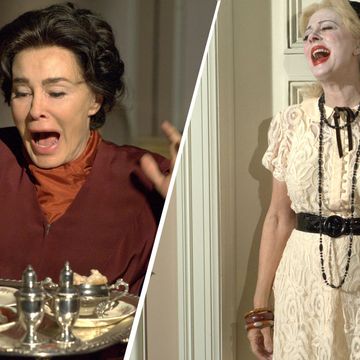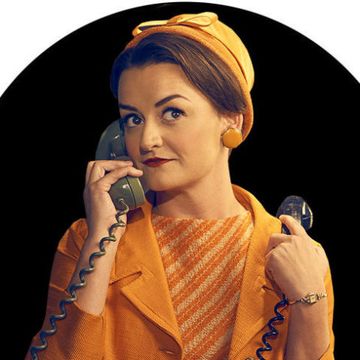It's finally here. The sky-high anticipation for Ryan Murphy's take on the legendary story behind What Ever Happened to Baby Jane? has made the wait feel endless, but tonight, Feud: Bette and Joan officially began on FX. Here are the nine standout moments from Susan Sarandon and Jessica Lange's first hour on-screen as Bette Davis and Joan Crawford.
1) Marilyn Monroe gets her Golden Globe.
Joan, in our first glimpse of her, glowers from the sidelines as Marilyn accepts her Golden Globe for Some Like It Hot in 1960. "I've got great tits too, but I don't throw them in everyone's face," she mutters, a prelude to the later scene in which she slams Marilyn's "vulgarity" and lack of "wholesome morals" to tabloid reporter Hedda Hopper. Needless to say, her real issue is jealousy: Marilyn is young and desired and in line for all the same roles that Joan used to get.
What's really striking about this Golden Globes scene, though, is the realization that Marilyn Monroe would be dead less than three years later.
2) Hedda Hopper cutting right through Joan's BS.
"I must have eaten something that disagreed with me." "Crow?" All hail Judy Davis as Hedda Hopper, the queen of shade who is saddled with all kinds of shamelessly expositional dialogue here, and makes all of it seem zingy and effortless. From the minute she waltzes into Joan's resplendent home unannounced and shamelessly needles a story out of her, she's a fully-formed and immensely fun character. She's also a necessary straight-talking antidote to Joan, who very rarely says exactly what she means unless forced.
Also, can we take a moment to appreciate Hedda Hopper's hats, both because that is a delightfully alliterative thing to say, and because they are stunning?
3) Joan recruits Bette from Broadway.
Everything about this nuanced face-off is just a joy to watch, from Bette passive-aggressively calling Joan by her birth-name "Lucille" to Joan passive-aggressively sympathizing with Bette over the poor reviews she's been getting for The Night of the Iguana on Broadway. Both women are the epitome of their most stereotypical public image here—Joan sweet and ingratiating, Bette sardonic and sharp-tongued—but the dynamic shifts once Joan offers Bette the lead role in What Ever Happened to Baby Jane?
Bette puts on a good front, pretending she's got plenty of better offers, but Joan sees right through her because they're in the same boat. Only by combining their star power do they stand a chance of recapturing Hollywood's attention. Joan does a lot of dissembling and bullshitting throughout the episode, but it's clear that she's right when she says "We need each other, Bette."
4) Jack Warner's meltdown.
Stanley Tucci is clearly having a lot of fun playing the Warner Bros. president as a more or less detestable slimeball. He's still bitter at Bette for getting out of her Warner contract in 1936 and basically blames her for the downfall of the studio system, which is a touch dramatic. Even worse is his monologue in which he casts himself as Zeus, and Bette and Joan as "a couple of Aphrodites" who had the gall to disobey him—and, even worse, to get old. Blegh.
Unfortunately by this point, Warner is Aldrich's last hope—no other studio is willing to finance Baby Jane, at least not without a radical rethink. I wonder if re-writing the script from the perspective of the "sexy neighbor girl," Rear Window-style, was a real suggestion.
5) Olivia de Havilland and Joan Blondell as Greek chorus.
As much exposition as Hedda has to deliver, it's nothing to what Catherine Zeta-Jones and Kathy Bates are given. The show is framed by Olivia de Havilland (Zeta-Jones) and Joan Blondell (Bates) explaining the backstory of Bette and Joan's feud to an unseen documentary filmmaker. The documentary-within-a-show feels unnecessary and a little tired to me—Murphy just didn't want to let this device go after American Horror Story: Roanoke, I guess—but it's a means to an end, and fills us in on Joan and Bette's parallel-yet-distinct trajectories as movie star versus serious actress.
6) "I'm the one who needed a wife."
Also during the documentary segments, we learn about Bette's marriage to her All About Eve co-star Gary Merrill, and how she was "miscast" in the role of wife and mother. Bette herself confirms this in a later scene, which reveals she's still involved with her now-ex husband Merrill (Mark Valley). When he ponders why they broke up, she points out that she was too busy working to be the kind of housewife he wanted. "I'm the one who needed a wife," she says, in a joke-but-not-a-joke line that suggests Bette Davis was a feminist ahead of her time, in an era when being unmarried and career-focused was even more of a taboo for women than it is now.
7) What Joan really wants.
Alongside Bette's scene with her ex-husband is Joan's scene with her mysteriously unnamed boyfriend, played by Reed Diamond. Side note: I spent fully thirty minute trying to figure out who this guy was—he's Joan's date to the Globes, seems to be at least a part-time live-in boyfriend, and is given a lot of key dialogue, but is not named either in the episode or on IMDB. Is he a ghost?
In any case, Joan's boyfriend is sick of her complaining about Bette Davis, and articulates the core theme of the show when he points out how much common ground they have: "You two really should be friends." But Joan doesn't want Bette's friendship—she wants her respect. When she won her Oscar she was deeply hurt to get congratulatory bouquets from men, but none from fellow actresses.
So naturally, when Bette finally cuts her a little slack on the Baby Jane set and tells her "When you're good, Joan, goddamnit you're good," Joan is thrilled almost to tears. As much as Feud is clearly going to relish chronicling the messy rivalry between these two women, Murphy and his co-writers are taking pains to make sure we're invested in their relationship first, enough so that its collapse feels tragic.
8) Bette's transformation.
Joan and Bette's on-set attitudes couldn't be more different: Joan goes around introducing herself to everyone on the crew, making an effort to be charming while Bette stalks by in silence, accusing Joan of being a suck-up. But Bette has an ace up her sleeve. The highlight of the pilot is that extraordinary moment when she makes her grand entrance in caked-on character makeup for the first time, too-white skin and too-red lips. As she embodies the persona of deranged former child star Baby Jane, bowing dramatically with the words "Hello, Daddy," the entire crew breaks into applause.
Bette ends up winning over the crew with a virtuosos moment of performance, while Joan tries to do the same by being superficially charming. Neither approach is right or wrong, but the set piece is a neat way to illustrate a contrast, rather than telling us yet again that Joan is a movie star and Bette is an actress. Bette doesn't care about looking beautiful—her career has never relied on aesthetics in the way Joan's did, and she's perfectly willing to make herself look like a horror show, while Joan watches the dailies anxiously, concerned about the harsh lighting on her face.
9) "Welcome to the house that fear built."
The above was apparently Hopper's real-life name for her mansion—and with good reason. What Bette and Joan believed to be invitations to a celebrity gathering turns out to be an ambush, as the pair end up dining alone with Hedda, who's determined to get the dirt on the on-set atmosphere. (The real ambush here is the menu, honestly, because dear God why was aspic ever a thing?)
Bette and Joan seem united in not wanting to give Hedda a story for now, and so both are all smiles. Joan talks about how she's wanted to work with Bette "since 1944," white Bette talks about how Joan was "already a big star when I arrived fresh off the boat." Hedda begrudgingly starts to write a puff piece about these two Hollywood icons, finally united in the twilight of their careers. Not the juicy blind item she had in mind—but it's only a matter of time.




